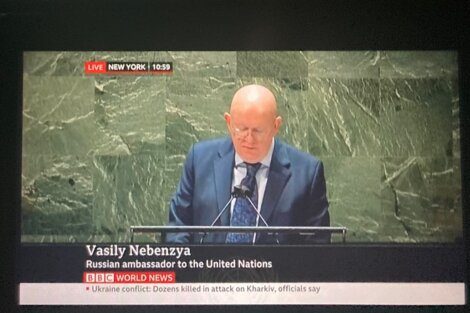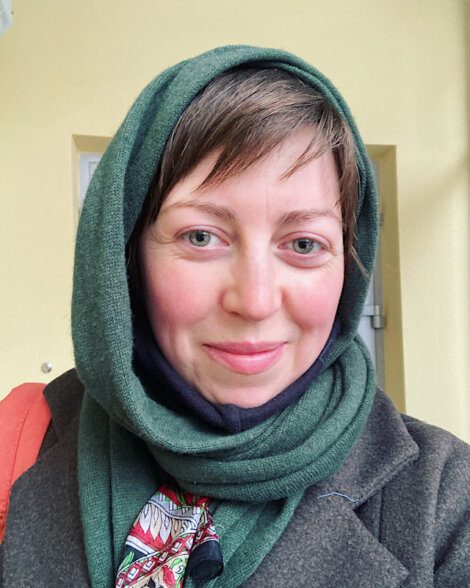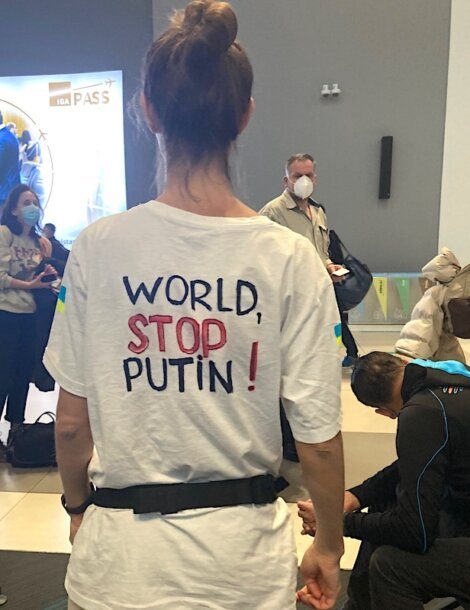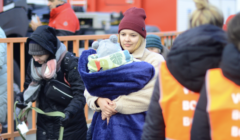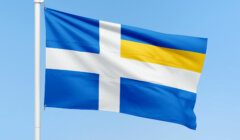News / ‘Ужас is a word I heard a lot recently. It means horror’
Shetland journalist Jen Stout, in Russia on the Alfa Fellowship Program for the last three months, has now left the country and has safely arrived in Austria. Here she reports on her encounters while leaving Russia.
WHEN the invasion of Ukraine began last week, I had just got off an all-night plane, blinking in the sun and snow of Gorno-Altaysk.
We were right in the heart of the continent, down in southern Siberia where the Chinese, Mongolian and Kazakhstan borders converge in the mountains. It is a beautiful, mythical place I’d long dreamed of visiting. But minutes after landing and switching on my phone, I wanted to turn straight back.
Three surreal days followed as I sat in cars glued to my phone, ignoring the vistas speeding by, walking like a zombie through striking scenery. My colleagues were the same, in total shock, reading the awful news. We were on a group trip with the fellowship I’ve been on.
The dinners were the worst, trying to make conversation but with stomach churning as I waited for replies from friends in Kyiv, in Kharkiv. I was there in 2019, in these beautiful, vibrant cities, and was blown away by Ukrainian culture and hospitality. I’d spent most of that trip in fits of laughter because these are the funniest, sweetest people I’ve ever met.
Rumours flew around each evening of airspace closing, bank bans, expats getting twitchy in Moscow. But it wasn’t until Saturday night 2am that the email came: the fellowship is ending, immediately, and you are all leaving on the first plane we can get you on.
I was glad. Before the invasion I’d been upset at the thought of leaving Russia after so many years of trying to get here. We’d only just finished three months of language school and I had huge plans for travel and reporting across the country, not least Sakhalin, to join the dots between that oil island and my own.
Become a member of Shetland News
But now all this seemed completely irrelevant. One argument after another with Russians (‘This is all just western hype, there is no bombing’; ‘What about the genocide in Donbass that you didn’t care about?’), all the while receiving messages from Ukraine that broke my heart. I was done.
Revolting
The strange version of reality that so many Russians fervently believe in has always been difficult to respond to. Frustrating. Now it just felt revolting; I couldn’t listen to it anymore.
There are people in Russia who don’t buy in to this bullshit, who think for themselves. Lots of them. As I packed my bags on Sunday night, friends dropped along the flat to say goodbye. We drank wine in my tiny kitchen and tried to sum up what we were feeling.
Ужас is a word I heard a lot recently. It means ‘horror’.
One friend couldn’t come because she was at one of the huge (for Russia) demonstrations against the war which have been taking place daily across the country. She knows she might end up in prison but feels a responsibility to speak out. To try and stop the war being waged in her name.
Another friend was arrested the other day. “I sang the Ukrainian national anthem in the paddy wagon’, he told me gleefully, as we said goodbye over the phone. “It went down so well I got an encore!”
On Monday, leaving behind a lot of books, I set off with two colleagues for Istanbul, one of the routes left open. Other people are going through Finland or driving to the Estonian border.
The fellowship staff were working all night to get us tickets – all I had to do was turn up at the airport. A very, very different experience from that of the hundreds of thousands of Ukrainians leaving their homes in terror, no known destination, no comfortable flights or hotels. I know folk at home were worried about me, but packing quickly is not exactly a hardship.
As we approached Budapest the TV showed BBC World News, a live broadcast of the UN emergency meeting. The Russian ambassador took the floor and told appalling, bare faced lies. Under his name – Vasily Nebenzya – the ticker tape read ‘Dozens killed in attack on Kharkiv’. Neat – the war crime displayed next to the perpetrator.
I couldn’t get any Internet access until we reached the hotel late in the evening, so it was only then that I saw videos of whole Kharkiv neighbourhoods being destroyed by rocket strikes. On CNN a military expert explained that the popping sounds were cluster bombs.
Later it emerged that they may even have used thermobaric weapons. These create a fireball which sucks the oxygen out of the air, ripping apart lungs, obliterating shelters and bunkers and bodies, and causing tissue and brain damage to people further from the blast.
We knew the Russian army have these as they were used in Syria. And because a CNN correspondent took a photo of the launcher on the road from Belarus. And because there are seemingly no limits to what the man in the Kremlin will do to these supposed ‘brothers’ of his, these people he is ‘rescuing’.
This morning (Tuesday) I got to Vienna, and I’ll stay in this bit of the world for a while, reporting. In the Istanbul departure lounge I met a woman wearing a homemade t-shirt painted with Ukrainian flags and slogans. We talked, and it turns out she’s from Kharkiv. A city of 1.4 million people – and yet Yana lives in the same building as my friend Bogdan. To my surprise she explained that they’re going back to Kharkiv, to be with family, despite the enormous danger. When asked how they’d get there, she shrugged: “Taxi maybe”.
In Vienna, queueing for passport control, I bumped into the couple again, and smiled at Yana. She didn’t smile back, and her boyfriend opened his phone to show me a video: Kharkiv’s main square, the grand facade of the local government headquarters. After a few seconds, a huge explosion turned the whole screen orange. Yana cried all the way to the passport booth. “Don’t worry, we’ll get there, we’ll manage!”, he kept saying.
Part of me hopes they won’t, and instead land somewhere safer, somewhere not being terrorised and bombed into submission by one of the world’s largest armies. It seems impossible that Ukraine could defeat this military. David and Goliath doesn’t even cover it. But they have held out so far. Their determination is extraordinary. Ukrainians won’t give in.
I saw Shetlanders are already gathering donations and sending aid – when I told my friend in Kyiv she was delighted. It matters, the international response, the condemnation, the solidarity.
The world is watching Kyiv, and in Kyiv they’re watching back, hoping we care.
Become a member of Shetland News
Shetland News is asking its many readers to consider paying for membership to get additional features and services: -
- Remove non-local ads;
- Bookmark posts to read later;
- Exclusive curated weekly newsletter;
- Hide membership messages;
- Comments open for discussion.
If you appreciate what we do and feel strongly about impartial local journalism, then please become a member of Shetland News by either making a single payment, or setting up a monthly, quarterly or yearly subscription.






